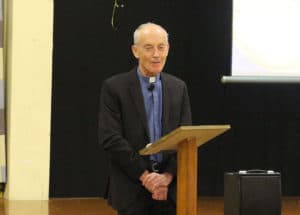A New Zealand canon lawyer has written that the clerical sexual abuse scandal has shown the need for more allowance for laity in Church governance.

Msgr Brendan Daly
In a paper last year in Studia Canonica, Msgr Brendan Daly analysed the 21 recommendations made in 2017 about the Catholic Church by the Australian Royal Commission into Institutional Responses to Child Sexual Abuse, and the Holy See’s responses to the recommendations forwarded to them by the Australian bishops. Msgr Daly also provided his own commentary. The Australian bishops accepted all but one of the recommendations, with the exception concerning the seal of the confessional.
The royal commission’s final report commented on the “lack of responsibility, transparency, and accountability within the Catholic Church’s practices and law”, Msgr Daly wrote. The report also showed what Msgr Daly described as “the catastrophic failure of bishops and religious superiors to deal with the perpetrators, to protect victims and potential victims, and to prevent abuse”.
One of the royal commission’s recommendations was that the Australian Catholic Bishops Conference request that the Holy See establish a transparent process for appointing bishops, which includes the direct participation of lay people. A request was also made that the current criteria for appointing bishops be published. The Holy See’s response noted the documents and canonical provisions that set these out, as well as the involvement of laity in the consultation process preceding the appointment of a bishop. The Holy See response also noted the need for discretion and the possibility of improvements, with child safety being given due consideration in the process for identifying candidates and naming bishops.
Msgr Daly wrote that the “massive failures in episcopal leadership” throughout the world raises the question of whether a different selection process would be a preventative measure.
He quoted a published opinion of Rik Torfs that the job description of a bishop has changed, “and this needs to be reflected in the qualities required of episcopal candidates” . . . “Bishops need to be people with moral courage, who can make the right decisions in difficult situations. A respectable but lenient churchman, intent primarily on maintaining the reputation of the Church, could be a liability when dealing with a clerical abuser.”
A governance review of the Catholic Church in Australia, to which Msgr Daly contributed, recommended wider consultation with laity during the episcopal appointment process, “as well as ensuring that candidates for the episcopacy have proven competence in dealing with sexual abuse cases”.
The governance review, the report of which was titled The Light from the Southern Cross, also recommended “a national protocol on seminarian selection, training, and ongoing formation; that each diocesan bishop (or dioceses in combination if appropriate) establish a panel involving women and lay men for the selection process for entry of candidates into the seminary and discernment prior to ordination; that lay people take a critical role in the formation of seminarians and evaluations of suitability for ordination; and that there be a requirement for each diocesan bishop to consult the panel before accepting a foreign priest”.
In conclusion, Msgr Daly’s paper noted that the royal commission blamed “clericalism as a key cause of failures to deal with the sexual abuse of minors within the Catholic Church. This is part of the systemic failure that led to neglecting the input of laity”.
A true separation of powers and more allowance for laity in Church governance are needed, Msgr Daly added.
“Pope Francis has promoted synodality, meaning the active participation of all members of the Church in its processes of discernment, consultation, and cooperation at every level,” the New Zealand canon lawyer added.
“Pope Francis believes that this renewal of the Church cannot be deferred [as] ‘the path of synodality is the path that God expects from the Church of the third millennium’, Msgr Daly quoted Pope Francis saying at the fiftieth anniversary of the synod of bishops.
“Synodality will result in better decisions in all areas of the Church’s life. The response of the Holy See to the recommendations of the royal commission reminds the Australian Church and all Church leaders that there needs to be a proper appreciation of the value of canon law in ecclesial practice. The sexual abuse crisis was exacerbated by an arbitrary, antinomian approach to canonical procedures and penalties. If canon law had been implemented, the commission of many crimes could have been prevented and both victims and the Church at large could have been spared considerable pain.”
Among the proposals in The Light from the Southern Cross was a National Catholic Synodal Leadership Council, to work with the Australian Catholic Bishops Conference. A body along these lines is reportedly in the working document leading up to the second assembly of Australia’s Plenary Council, scheduled to be held in July. One of the themes of the working document is “Ecclesial Leadership and Governance – Growing as Disciples and Servants of the Gospel”. Discussion on this document will help with preparing resolutions for the second assembly.
Reader Interactions